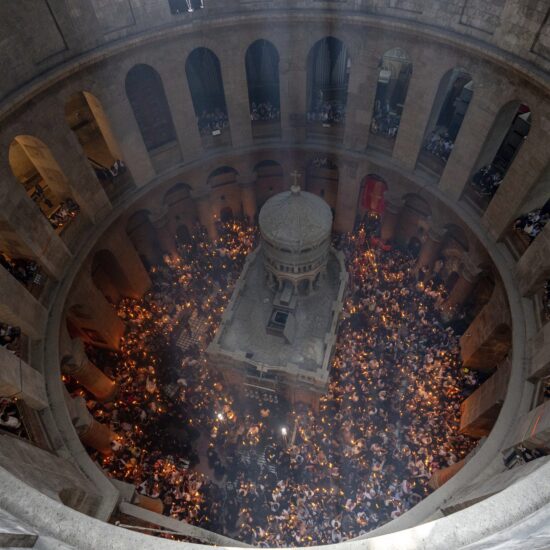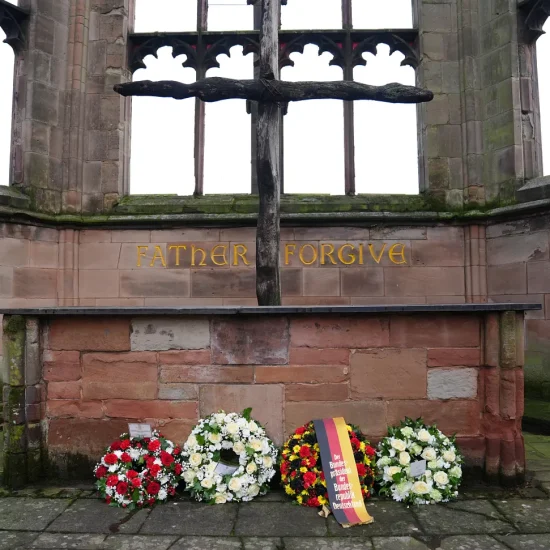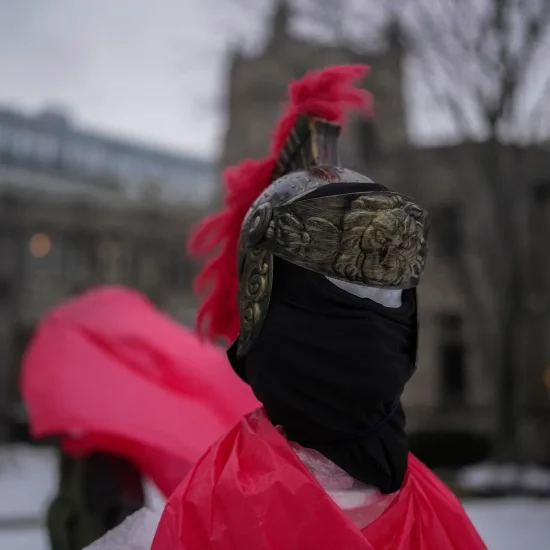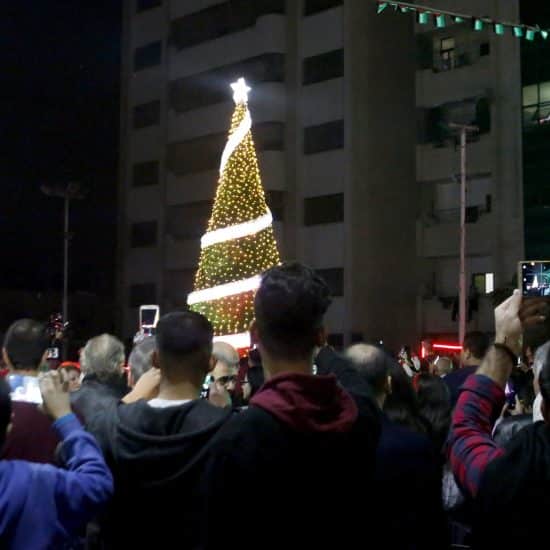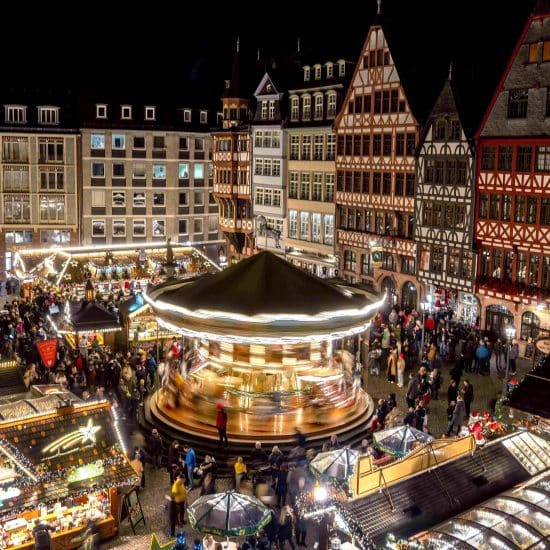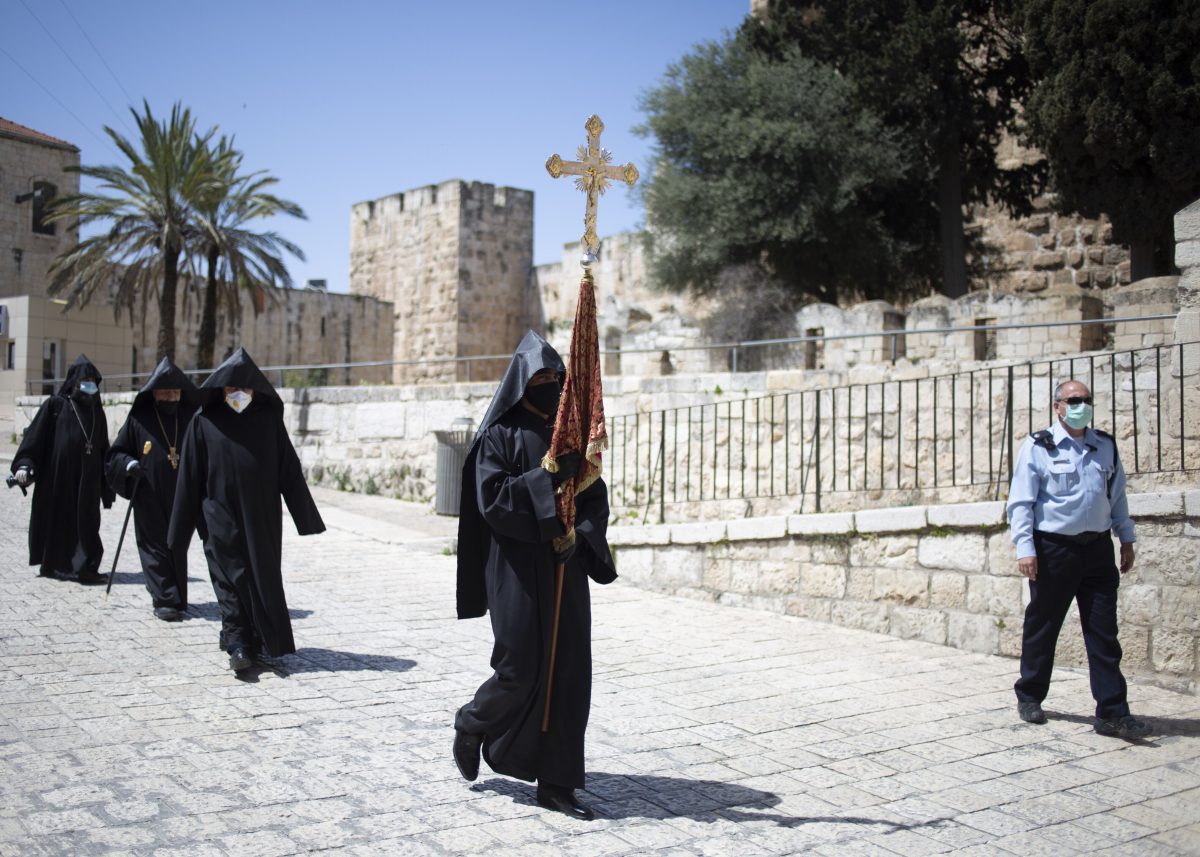
(RNS) — Jerusalem’s Armenian Christian quarter dates back to the fourth century, when a small band of pilgrims and monks from the newly Christianized Armenia — 800 miles away on the far side of Turkey — settled in the neighborhood around the Upper Room, the building thought to be the site of the Last Supper. Today, Armenians still occupy a large part of the Old City where the Armenian Apostolic Church, under the independent Armenian Patriarch of Jerusalem, maintain its own chapels and a school.
Simon Azazian, a communications director at the Palestinian Bible Society whose father is Armenian and mother Palestinian Arab, says that positive relations between Armenians and their Palestinian neighbors, like much in Jerusalem, have a long history.
“Armenians helped with the ceramics of Al-Aqsa Mosque,” he notes, referring to the eighth-century house of worship, the third-holiest site in Islam.
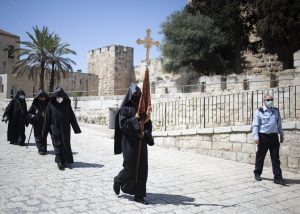
Armenian clergymen with face masks and gloves walk towards the Church of the Holy Sepulchre, traditionally believed by many Christians to be the site of the crucifixion and burial of Jesus Christ, in Jerusalem’s old city on April 18, 2020, after the traditional Holy Fire ceremony was called off amid coronavirus. (Ariel Schalit/Associated Press)
But recently a disused, rubble-filled piece of land has caused friction between the ancient Christian community and the local Palestinian community, which is in administrative control of East Jerusalem despite Israel’s longtime military occupation and effective annexation of the area.
The Armenians say they asked the Palestinian government and others for help in restoring the land — estimates for removing the rubble alone run to $2 million — but none came through. Eventually the Armenians turned to the Israeli Jerusalem municipality, which, along with the Jewish nationalist Jerusalem Development Co., agreed to help remove the mounds of dirt and prepare a parking lot, on the condition that at least 90 spots would be reserved for residents of the Jewish quarter and visitors to the nearby Western Wall.
The 10-year contract for the parking lot, which will take effect Jan. 1, has sparked anger among Palestinians, including Palestinian Christians who worry the agreement will further entrench Jewish control over occupied East Jerusalem.
“Once the Israelis get a further foothold in the old city no power on earth will remove them,” said a senior Palestinian official who asked not to be named because of his sensitive position dealing with Christian religious issues.
But in a 10-point statement, the Armenian Patriarchate, which owns the land, said it has no choice.
“This is a financial obligation that the Patriarchate by itself, doesn’t have the capacity to undertake,” it said. The parking lot, the statement added, “will remain private and that the management, ownership of the parking lot will remain in the hands of the Patriarchate.”
The controversy has taken on added significance because of a recent rise in anti-Christian sentiment among Palestinians. A late December memo from the Hamas-run Islamic Guidance Office that called on Islamic clergy to reject “Christmas culture” was leaked to the press. Making matters worse, the memo, which has since been retracted, used the English word for Christmas, an indirect signal that Christianity is a foreign religion.
On Dec. 26, two large Christmas trees in a public display in the Galilee town of Sakhnin were torched by unknown arsonist. The same day, a Palestinian man from Hebron was caught on video making fun of the Church of the Nativity and the Christmas tree in Bethlehem. Though both events were roundly condemned, some observers say they reflect underlying political and socioeconomic tensions between Palestinian Muslims and Christians that are being expressed in religious terms because of the season.
Azazian noted that the recent war in Nagorno-Karabakh, an Armenian enclave in Azerbaijan, in which Turkey sided with Azerbaijani Muslims against Armenians, has poisoned the atmosphere of late. But others point to dying hopes of a peace agreement that would end Israeli pressure on the Palestinian territories.
“As long as we live without a viable solution, radicalism increases since many also believe that the West, which is mainly Christians, isn’t taking viable steps to end the current political reality of the occupation,” Vera Baboun, a former mayor of Bethlehem, told Religion News Service.
Indeed, the discussions over the Armenians’ parking lot are being conducted along the lines of an international negotiation. The Higher Presidential Committee of Church Affairs in Palestine wrote to Armenian Patriarch Nourhan Manoogian to remind him that the Armenian quarter is part of occupied Palestinian territories under U.N. resolutions, including the 2017 UNSC Resolution 2334.
A letter signed by Ramzi Khoury, the director of the church affairs committee, called on the Armenian patriarch “to abide by international law” and noted that Israel has “expansionist ambitions” in the Old City.
Khoury told RNS that Palestinians have always considered the Armenian quarter as part of the future Palestinian capital in Jerusalem. During the 2000 Camp David talks, Palestinian Authority President Yasser Arafat refused to concede the Armenian quarter to the Israelis, jokingly calling himself “Arafatian” — Armenian last names commonly end with ‘ian.’ Armenians have also consistently held that the Palestinian Christian and Armenian quarters are “inseparable.”
And the patriarchate’s statement makes clear that despite their collaboration on the parking lot, the Armenians are hardly warming to Israel. In March, the Israeli police fined a young Jewish man for spitting at an Armenian bishop a year earlier — an act Armenian clergy say is no rarity. The patriarchate’s statement also explained that “within the next ten years, once the patriarchate has finalized and received all construction permits, the patriarchate will begin a new construction that will benefit the Armenian community.”

